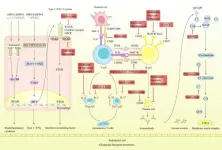(Press-News.org) Patients with lupus nephritis (LN), a severe complication of systemic lupus erythematosus (SLE), often undergo progressive kidney damage, with approximately 20% of these patients advancing to end-stage renal disease. The current therapeutic landscape for LN, dominated by glucocorticoids and immunosuppressants, is limited by suboptimal response rates, the risk of disease flare-ups and adverse effects, accentuating the necessity for safer and more effective treatment modalities. In the latest issue of the Chinese Medical Journal (CMJ) published online on December 15, 2023, a review authored by Dr. Wei Chen from the Department of Nephrology of the First Affiliated Hospital, Sun Yat-Sen University, provides a comprehensive overview of the targeted therapies for LN in clinical settings.
LN presents a multifaceted pathogenesis, characterized by an accumulation of immune complexes and a malfunctioning complement system. The early stages of LN are defined by the infiltration of innate immune cells like neutrophils, macrophages, and dendritic cells. These cells incite local inflammation and tissue damage via the release of pro-inflammatory mediators. Progression of the disease involves B-cells dysregulation, leading to improper production of autoantibodies. A critical aspect of LN's progression is the dysregulated activation of self-reactive T-cells, facilitated by antigen recognition through the T-cell receptor and augmented by co-stimulation through CD28 and B7 interactions. This suggests the potential for therapeutic strategies that concurrently target multiple aspects of LN's underlying mechanisms.
Therapeutic strategies for LN increasingly focus on B-cell targeting, employing monoclonal antibodies (mAbs) techniques to deplete B-cells or suppress B-cell activity. Rituximab, an anti-CD20 mAb, has been effective in markedly reducing B-cell counts and enhancing renal function. Consequently, it is recommendation as a supplementary therapy for persistent or recurrent LN in key guidelines, including the Kidney Disease Improving Global Outcomes (KDIGO) 2021 and the European League Against Rheumatism/European Renal Association–European Dialysis and Transplant Association (EULAR/ERA-EDTA) 2019. Other therapies such as Belimumab targeting BAFF to suppress B-cell survival, are effective in improving SLE outcomes and renal responses, making it the sole FDA-approved targeted therapy for LN. Atacicept and Telitacicept targeting BAFF and APRIL, show promise but require further validation through LN-specific clinical trials. Additionally, therapies like Daratumumab effectively target plasma cells, and proteasome inhibitors such as Bortezomib are emerging as potential treatments for autoimmune diseases, including LN.
Dr. Chen discusses alternate approaches, “Chimeric antigen receptor-modified T (CAR-T) cells, engineered to target CD19 and other B-cell surface antigens, have emerged as promising alternatives to T-cell depletion. Preliminary evidence from animal models and case reports suggests that CD19-directed CAR-T cells outperform anti-CD19 antibodies in depleting CD19-positive B-cells, both in terms of efficacy and duration.”
Dysfunctional T-cell activation, particularly through the CD40- CD40L interaction, is a key factor in the pathogenesis of LN. Clinical trials investigating a first-generation anti-CD40L antibody, Ruplizumab, aimed at this interaction were halted due to severe thromboembolic complications. Simultaneously, trials for second-generation anti-CD40 antibodies, such as BI 655064, intended to reduce thromboembolic risks, have not shown significant efficacy in treating LN.
Patients with LN often present with elevated levels of interferons (IFNs), pro-inflammatory interleukins (ILs), and tumor necrosis factors, which stimulate the JAK/STAT signaling pathway. This upregulation suggests these molecules as potential therapeutic targets. Nonetheless, several JAK inhibitors, including Deucravacitinib, Olcitinib, R333, and Filgotinib, have either been ineffective or discontinued due to adverse side effects. Additionally, IL-6 targeted therapies, such as Sirukumab, PF-04236921, and Tocilizumab, have not provided substantial clinical trial evidence regarding their safety or efficacy in LN treatment.
“Given the complex and heterogeneous nature of LN, multiple factors may account for trial failures,” Dr Chen emphasizes the importance of rigorous patient selection, including stratification through genetic and biomarker analyses, for evaluating targeted therapies. Dr. Chen further adds, “Other key elements include the integration of investigational agents into established standard-of-care protocols, vigilant surveillance for adverse events, and consideration of comorbidities.”
Overall, a summary of the latest updates in targeted therapies in LN may imply that clinical trial failures underscore gaps in our understanding of LN pathogenesis. As genomic sequencing and high-throughput technologies advance, new therapeutic targets and mechanisms may emerge, providing further insight into the disease and its treatment.
***
Reference
Titles of original papers: Targeted therapies for lupus nephritis: Current perspectives and future Directions
Journal: Chinese Medical Journal
DOI: https://doi.org/10.1097/CM9.0000000000002959
About Dr. Wei Chen from the Department of Nephrology of the First Affiliated Hospital
Dr. Wei Chen is a professor and chief physician at the Department of Nephrology of the First Affiliated Hospital of Sun Yat-Sen University, Guangzhou, China. Holding a MD from Peking Union Medical College in Beijing, she furthered her expertise with post-doctoral research at the University of Colorado's Department of Nephrology in Denver, USA. As director of the Key Laboratory of Clinical Research on Kidney Diseases under the National Health Commission, a member of the CME Committee of the Asia Pacific Society of Nephrology, and Deputy Chairman of the Nephrology Society of the Chinese Medical Association, Dr. Chen has a broad research portfolio covering immune-related kidney diseases and chronic kidney diseases. Her distinguished career includes over 100 published research papers and numerous significant research contributions in her field.
END
San Francisco and New York — Dec. 13, 2023 — The Parker Institute for Cancer Immunotherapy (PICI), the largest concentration of immuno-oncology (IO) expertise in the world, announced it has added Weill Cornell Medicine to its network of preeminent academic and medical research institutions at the forefront of the fight against cancer. Under the agreement, Weill Cornell Medicine, with new PICI Network researchers, will establish a PICI immuno-oncology research center in New York City.
Since its inception, PICI has distributed $260 million to member researchers to support ...
Manatees are endangered species volatile to the environment. Because of their voracious appetites, they often spend up to eight hours a day grazing for food within shallow waters, making them vulnerable to environmental changes and other risks.
Accurately counting manatee aggregations within a region is not only biologically meaningful in observing their habit, but also crucial for designing safety rules for boaters and divers as well as scheduling nursing, intervention, and other plans. Nevertheless, counting manatees ...
DETROIT (December 13, 2023) – Published results of a large, national heart attack study show that patients with a life-threatening complication known as cardiogenic shock survived at a significantly higher rate when treated with a protocol developed by cardiologists at Henry Ford Health, in collaboration with 80 hospitals nationwide.
Cardiogenic shock is a critical condition in which the heart is unable to pump enough blood to sustain the body’s needs, depriving vital organs of blood supply. This can cause those organs to eventually stop functioning. The typical survival rate of this deadly complication during a heart ...
Researchers from Northwestern University, University of Pennsylvania, and University of Colorado published a new Journal of Marketing study that proposes abandoning null hypothesis significance testing (NHST) as the default approach to statistical analysis and reporting.
The study, forthcoming in the Journal of Marketing, is titled “‘Statistical Significance’ and Statistical Reporting: Moving Beyond Binary” and is authored by Blakeley B. McShane, ...
Oceans cover most of Earth’s surface and support a staggering number of lifeforms, but they’re also home to a dilute population of uranium ions. And — if we can get these particular ions out of the water — they could be a sustainable fuel source to generate nuclear power. Researchers publishing in ACS Central Science have now developed a material to use with electrochemical extraction that attracts hard-to-get uranium ions from seawater more efficiently than existing methods.
Nuclear power reactors release ...
The vast majority of older adults – 83% -- think health insurers should cover medications that can help people with obesity manage their weight, a new poll of people age 50 to 80 finds.
Nearly as many -- 76% -- believe Medicare should cover these drugs, which it cannot currently do under law, according to the new results from the University of Michigan National Poll on Healthy Aging.
A law passed in 2003 prohibits Medicare from covering weight loss medications, though it can cover drugs to help people with Type 2 diabetes manage their weight. Medicaid covers obesity medications ...
With an estimated 1.9 million new cases and more than 600,000 deaths each year, cancer remains the second most common cause of death in the U.S., trailing only heart disease. And while there are more than 200 types of cancer, the abnormal synthesis of a protein known as STAT3 is unique to the majority of tumors.
STAT3 is known as a transcriptional regulator, which means it regulates the expression of several genes. In fact, STAT3 is associated with approximately 70% of all human tumors and is responsible for uncontrolled cell growth and disease progression.
To investigate new approaches to inhibit STAT3 and develop new cancer treatments, the National Institutes of Health-National ...
Flat-faced dog breeds are popular all over the world. In the USA and in Hungary, the French Bulldog is currently the most common breed. However, their popularity comes at a high cost in terms of health: shortened skulls are associated with deteriorative brain morphology changes, breathing difficulties and sleep problems. According to recent findings by Hungarian researchers, flat-faced dogs sleep more because their breed-specific sleep apnea increases daytime sleepiness, their REM sleep phase is longer than ...
The University of Texas at San Antonio today announced the selection of David Brown as the new executive director of its National Security Collaboration Center (NSCC) and professor of practice. Brown will join UTSA with decades of experience leading collaborative research and development ecosystems supporting U.S. national defense strategies.
Brown is a trusted, well-connected leader in civilian and military communities nationwide who has especially strong relationships within U.S. Department of Defense (DoD) organizations, laboratories and commands and has gained national recognition for his transformative leadership in federal research ...
Studies on sustainability inevitably touch on food-related topics like food security, culinary heritage, and the sustenance of vulnerable people. Social sustainability is one of the three pillars of sustainability, alongside environmental and economic sustainability, and has become a pivotal topic in various research fields. It includes concerns about social justice, resource distribution and recognition, and political participation of marginalized groups at the local community level.
Very few studies of social sustainability have looked at urban foodways in terms of social and cultural infrastructure. More often than not, scholars in Japan have ...









